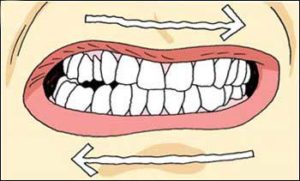If you find yourself waking up with sore jaw muscles or a headache, you may be suffering from bruxism – the grinding and clenching of your teeth. Bruxism can cause teeth to become painful or loose, and sometimes parts of the teeth are literally ground away. Eventually, bruxism can destroy the surrounding bone and gum tissue. It can also lead to problems involving the jaw joint, such as temporomandibular joint syndrome (TMJ).

For many people, bruxism is an unconscious habit. They may not even realize they are doing it until someone comments that they make a horrible grinding sound while sleeping. For others, a routine dental check-up is when they discover their teeth are worn or their tooth enamel is fractured.
Other potential signs of bruxism include aching in the face, head and neck. At the Surbiton Smile Centre ®, we can make an accurate diagnosis and determine if the source of facial pain is a result from bruxism.
If you notice any of the following symptoms, you may be experiencing bruxism:
The appropriate treatment for you will depend on what is causing the problem. By asking careful questions and thoroughly examining your teeth, we can help you determine the potential source of your Bruxism. Based on the amount of tooth damage and its likely cause, we may suggest:
Wear a mouthguard while sleeping. Custom-made by us to fit your teeth, the mouthguard slips over the upper teeth and protects them from grinding against the lower teeth. While this is a good way to manage bruxism, it is not a cure.
Find ways to relax. Everyday stress seems to be a major cause of Bruxism, so anything that reduces stress can help, whether it is listening to music, reading a book, taking a walk or having a bath. It may help to seek counselling to learn effective ways for handling stressful situations. Also, applying a warm, wet flannel to the side of your face can help relax muscles sore from clenching.
Reducing the “high spots” of one or more teeth to even your bite. An abnormal bite, one in which teeth do not fit well together, may also be corrected with new fillings, crowns or orthodontic
Bruxism can happen during both the day and night, although sleep-related bruxism is often the bigger problem because it is harder to control.
The main cause of bruxism is unknown, but possible causes might be the psychosocial factors; stress and anxiety. No specific drugs exist to treat this problem. The only treatment that is proven to be effective is the bite or splint. This is a type of shield, when positioned between the upper and lower teeth, protects the tooth enamel and encourages realignment of the jaw, at the same time minimising the effects of bruxism.
Please get in touch if you are concerned about any aspect of your dental health. We will treat you fairly and honestly - and we look forward to being able to help you.
